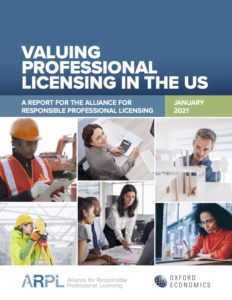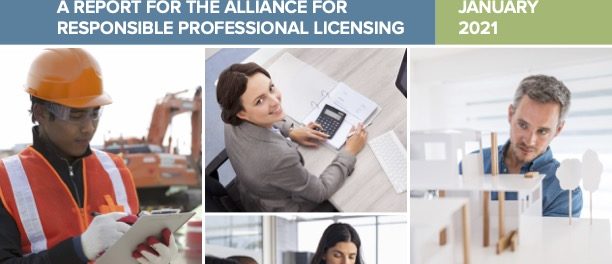Blanket calls for deregulation wrongly treat professions and occupations alike, report finds
As proposals to deregulate occupations have proliferated in recent years, they are often rationalized by the claim that 25% of workers hold a certificate or license in the U.S. That’s about five times the proportion of licensed or certified workers in the 1950s, according to a new report analyzing the value of professional licensing.
But while the growth in credentialing is a fact, too often these calls for deregulation are not tailored to address specific trades and vocations, argue the authors of the report, Valuing Professional Licensing in the U.S. One size does not fit all, they contend. In addition, deregulation proponents fail to take into account the benefit to the public of licensing protections and the impact on workers’ wages.
Produced by the policy analysis firm Oxford Economics for the Alliance for Responsible Professional Licensing, the report consists of a literature review, a “deep dive” into three groups of professions, and empirical analysis of the effects of licensing on hourly earnings
 Oxford Economics is a commercial venture, founded in 1981 with Oxford University, and describes itself as a key adviser to corporate, financial and government decision makers and thought leaders.
Oxford Economics is a commercial venture, founded in 1981 with Oxford University, and describes itself as a key adviser to corporate, financial and government decision makers and thought leaders.
The key findings of the report about wage benefits of licensing are:
- Across all professions and occupations, licensing is associated with a 6.5% average increase in hourly earnings, even after accounting for the jobholder’s educational attainment, gender, and racial demographics.In technical fields that require significant education and training, a license narrows the gender-driven wage gap by about one third and the race-driven wage gap by about half.
- Minority engineers, surveyors, architects, landscape architects, and CPAs can expect an 8.1% hourly wage increase on average after becoming licensed in their field.
- Female engineers, surveyors, architects, landscape architects, and CPAs can expect a 6.1% hourly wage increase on average after becoming licensed in their field. (Across all college-educated workers, the authors add, a license is associated with significantly different earnings gains for men and women. Women earn wages that are 20% higher while men earn wages that are 8% higher.)
- Both white professionals and male professionals were shown to benefit from licensing too, but to a lesser degree. White engineers, surveyors, architects, landscape architects, and CPAs can expect a 2.9% hourly wage increase after becoming licensed; and males in these professions can expect a 0.7% hourly wage increase after becoming licensed.
- Those in trade and vocational occupations (e.g., barbers or plumbers) can expect a 7.1% hourly wage increase after becoming licensed, while those in a profession requiring advanced education and training (e.g., engineers or architects) can expect a 3.6% wage increase after becoming licensed.
The study authors cite two reasons that licensing, in theory, could produce these wage differences: First, licensing functions as a signal of high productivity, similar to a university degree, and second, licensing increases barriers to entry, thereby reducing the availability of practitioners and increasing wages. One source estimates that signaling accounts for two thirds of the wage differences while entry barriers account for one third.
However, the authors note, a widely quoted study showing the wage advantage of 28% for licensed workers over unlicensed peers does not control for differences in education, training, and experience. Studies that avoid that failing find that licensing is associated with 10% to 15% higher wages, they point out.
Worker mobility is affected by licensing but not because a license itself discourages mobility, the report finds. Rather, the differences among different states’ requirements are the probable cause, since professions’ regulatory harmonization increases cross-border labor migration.
The study also emphasizes that differing skill levels and public impacts of professions help determine wage differences. “While licensing and skills both increase wages, licensing has a stronger wage effect at the bottom of the skill distribution,” the authors state. “This implies that both barbers and engineers are better off with a license, but to a very different extent, suggesting that equalizing all licensed occupations under one single regulatory framework could have potentially dangerous and unintended consequences.”
The authors maintain that their study supports differing regulatory approaches for highly skilled professions. Professional licensing of highly skilled workers should be regulated separately from occupational licensing of trades and vocations, the report recommends.

